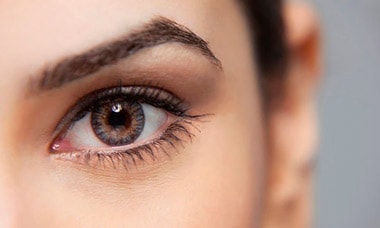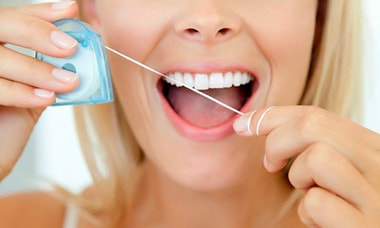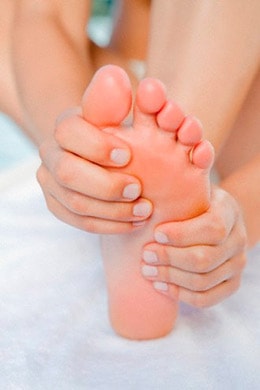Mirror Diagnosis - What Can You Learn About Your Health From Your Own Body?
Every day, your body tells you a lot of trivial things, like reminding you to scratch your elbow, eat more salt… But hidden behind those little reminders can be much more serious messages about your health. Let’s try it together: What do you know when you look into your eyes?
Every day, your body tells you a lot of trivial things, like reminding you to scratch your elbow, eat more salt… But hidden behind those little reminders can be much more serious messages about your health. Let’s take a look:
What do you know when you look into your eyes?

The windows of the soul will tell you many things (Photo: Inmagine)
If it’s a little gray: It’s probably just a natural aging process. Ophthalmologists explain that this happens because the sclera (the membrane covering the eye) thins over time, making the underlying blood vessels more visible. There are also serious medical conditions that can cause the whites of your eyes to turn gray, including rheumatoid arthritis and brittle bone disease. First, schedule an appointment with your doctor to find a treatment.
If it's red: Your eyes are most likely dry. The red streaks you see are tiny blood vessels that become more prominent when the eyes are irritated. Dry eyes can be a side effect of aging, prolonged computer use, or environmental factors like air conditioning. You can use preservative-free artificial tears with ingredients like glycerin, which are available at drugstores, to keep your eyes moist and soothe irritation. Use them four to six times a day as needed. If you also have itchy, watery eyes, it may be due to allergies, and over-the-counter antihistamines can help. If your dry eyes get worse, see your doctor, as they can be a symptom of conditions like thyroid disease or diabetes.
If it is yellow: This could be a symptom caused by high levels of bilirubin – a product of red blood cells. See your doctor immediately because jaundice can be a sign of many serious health problems such as liver dysfunction, hepatitis, and even pancreatic cancer.
What do you know from your own mouth?
If your gums are swollen or bleeding: “You may have periodontal disease,” says dentist Greg Diamond. About 75 percent of people over 40 have it. He says most people think it’s normal to spit out a little blood after brushing, but it’s not. Bleeding gums are not normal. And while periodontal disease may not be painful, the bacteria that cause it can have “brothers” like heart disease and stroke. Don’t let this “family” grow in your body: brush after meals, floss daily, and get annual dental checkups.

With teeth, there are things that seem normal but turn out to be very abnormal.
(Photo: Inmagine)
If you have a white or pale red spot near the back of your tongue: Get tested for HPV. HPV is hard to detect and usually goes away on its own, but in some cases it can develop and cause cancer of the mouth, throat, or cervix. So if you have it, you need to be closely monitored.
If your tongue is smooth and shiny and you can't see the taste buds: You may have a vitamin B12 deficiency, says Dr. Jacob Teitelbaum. Cracks at the corners of your mouth can also be a sign of vitamin B deficiency.
What do you know from your hunger?
If you crave salt: It may seem unrelated, but frequent salt cravings can mean you need to find ways to… reduce stress. Frequent salt cravings can indicate that your adrenal glands, which pump adrenaline and other hormones into your bloodstream when you’re anxious, are overworked and temporarily “paralyzed.” Adrenal glands produce a hormone that helps retain sodium in your body, and when they don’t produce enough of it, you may crave salt, says Susan Blum, MD, founder and director of the Blum Center for Health and Wellness in Rye Brook, New York. Try exercising, meditating, or whatever stress-relieving techniques work for you.
If you crave fat: Eating sweets or simple carbohydrates can lead to more cravings. And consuming fat has a similar effect, experts say. Eating fatty foods triggers the brain to produce peptides that make you crave fatty foods even more. A recent study at the Scripps Research Institute in Jupiter, Florida, found that mice fed high-fat foods (bacon, egg white cream, etc.) ate more and more of them—like an addiction. (They even refused nutritious foods when offered them.) Resist the urge to eat high-fat junk food by eating more lean protein and low-fat dairy products.

Lying down to sleep right away isn't necessarily lucky (Photo: Inmagine)
What do you know from your sleeping habits?
If you fall asleep as soon as your head hits the pillow: Surprise, surprise, according to James Herdegen, medical director of the Sleep Science Center at the University of Illinois at Chicago. The average person needs 10 to 15 minutes of rest before falling asleep, and the ideal amount of sleep is about eight hours a night. If you’re getting enough sleep and still have trouble sleeping, see your doctor to determine if you have a sleep disorder like restless legs syndrome.
If you wake up frequently during the night: It’s not that you have trouble falling asleep, it’s that you have trouble staying asleep. This disorder is linked to anxiety, depression, and sleep apnea. If you wake up frequently at night, and have daytime sleepiness and fatigue for more than four weeks, don’t wait any longer and seek medical help.
What do you know from your hair?
If your hair is thinning: If thinning hair runs in your family, you may be experiencing hair loss, which affects 30-40% of women. A dermatologist can prescribe medication and treatment. Also, be aware that tight, high ponytails can put tension on your hair structure, causing traction alopecia.
If your hair part is wider than usual: You may be stressed. But be aware: losing a handful of hair – up to 100 strands a day – is also normal. A significant physical event such as surgery, childbirth, or significant weight loss can cause hair follicles to go into a resting state and temporarily stop growing hair. Relax, once your body has recovered, your hair will grow back.

Your skin - your body's largest organ - certainly has a lot to tell you (Photo: Corbis)
What do you know from your skin?
If it suddenly becomes dry and itchy: You may be having a reaction to a new skin care product. You may also need to get your thyroid and iron levels checked, as dry skin can be a sign of low thyroid levels or anemia. Go see a doctor and get a simple blood test to get effective treatment.
If you have jawline acne: Your hormones may be running a little wild. Jawline acne is common in women in their 30s and 40s—even those with clear, acne-free skin—especially around the time before their period. It can be treated with creams containing salicylic acid or benzoyl peroxide. If it doesn’t go away, you may want to see your doctor to have your hormone levels checked. Often, hormonal acne can be improved with oral medications like birth control pills.
If you have a rash that won’t go away: This could be a mild form of eczema, triggered by stress. To soothe the itch, you can apply a moisturizer containing ceramides a few times a day or try the more environmentally friendly olive oil, which adds a layer of essential fats to your skin and has anti-inflammatory properties that can help fight eczema. If you have any concerns, it’s best to see a dermatologist so he or she can diagnose your condition and prescribe the right treatment.
What can you learn from your urine?
If it's pale yellow or clear: Great, you're well hydrated. This means you're drinking enough water each day to dilute your yellow urine.
If it's yellow: Start doubling your water intake and eat plenty of water-rich fruits like watermelon every day. However, if you've taken a multivitamin in the past 24 hours, bright yellow urine sometimes indicates that your body has absorbed the vitamin well, as when you take a multivitamin, your body uses what it needs and excretes the rest. If your urine is quite clear after taking the medication, it means that you haven't absorbed it well. In this case, switch to a vitamin in capsule or powder form, which is easier to absorb than tablets.
If it is cloudy/cloudy: You may have a bladder or kidney infection. These clouds are the presence of white blood cells that your body has produced to fight the infection. Go to the hospital or see your doctor for diagnosis and treatment.
If you see blood or very dark urine: In this case, we advise you to see a doctor immediately (unless you are menstruating) because according to experts, very dark urine or urine mixed with blood can be a sign of many different diseases, from kidney disease to bladder infection.

Your feet are the place that often bears the weight of the entire body, so you should pay more attention to them (Photo: Corbis)
What do you know from your feet?
If your heels or the balls of your feet hurt when you walk: You may have flat feet, which means your arches collapse more than normal when you put weight on them. People with this condition may also have knee pain and lower back pain. Try using arch supports, and if the pain persists, see your doctor.
If your legs cramp when you walk: This could be a sign of peripheral artery disease, poor blood circulation to the limbs – this poor circulation can lead to a buildup of lactic acid in the leg muscles and cause cramps. You should see a doctor soon for diagnosis and treatment.
According to ((Webtretho) - PC






